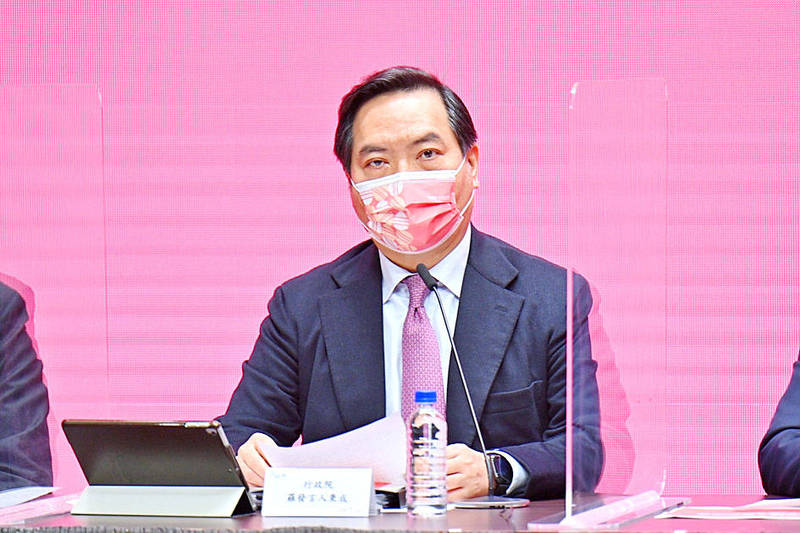《TAIPEI TIMES》 Fukushima food ban to end after 11 years

Executive Yuan spokesman Lo Ping-cheng speaks to reporters at the Executive Yuan in Taipei yesterday. Photo courtesy of Executive Yuan via CNA
SAFETY FIRST: Food products from around Fukushima would be inspected batch by batch, while some products, such as mushrooms, would still be banned outright
By Shelley Shan / Staff reporter
Taiwan is by Feb. 28 to end an 11-year ban on food products from five Japanese prefectures that was implemented after the Fukushima Dai-ichi nuclear power plant disaster, as long as importers and manufacturers provide a certificate of origin and a radiation inspection certificate for the products.
The Executive Yuan announced the policy change at a news conference in Taipei yesterday morning, following weeks of criticism and speculation from opposition party lawmakers.
The ban is widely considered a major roadblock in the government’s attempt to join the Comprehensive and Progressive Agreement for Trans-Pacific Partnership (CPTPP).
Many countries temporarily restricted imports of food products manufactured in and around Fukushima Prefecture following the 2011 disaster, Executive Yuan spokesman Lo Ping-cheng (羅秉成) said.
On March 25, 2011, Taiwan also banned imports of all food products made in Japan’s Fukushima, Ibaraki, Tochigi, Gunma and Chiba prefectures, he said.
“However, during the past 11 years, the Japanese government gradually lowered the safety risks posed by food manufactured in these prefectures by adopting food safety standards that are stricter than the ones used by the international community. As a result, more than 40 countries have completely lifted restrictions on imported food from Japan, including the nations in the CPTPP,” Lo said.
Israel and the US also lifted restrictions last year, while the EU only requires food importers or manufacturers to submit radiation inspection certificates for certain high-risk food products, he added.
Taiwan and China are the only countries that still ban food products made in the five prefectures, Lo said, adding that even Hong Kong and Macau have eased regulatory measures.
“As a trade-oriented country, Taiwan cannot disregard international standards and scientific evidence if it seeks to join the CPTPP. Japan — a signatory of the partnership — has for years shown concern over Taiwan’s regulatory practices regarding Japanese food products,” Lo said.
“We, as a responsible government, must address reasonable demands from the Japanese government and resolve the issue,” he added.
The government would ensure food safety by using science-based criteria in the examination of food products, Lo said, adding that the criteria would also be stricter than those applied in other countries.
Rather than placing a blanket ban on products from specific regions, the government would prohibit the importation of certain products from Japan, Lo said.
Certificates of origin and radiation inspection certificates would be required to import products from the five prefectures, as well as other Japanese prefectures, he said.
Food products from the five prefectures would be subject to batch-by-batch inspections, Lo said.
The government has sufficient capacity to conduct the inspections, he added.
Details of the new policy would be made available for public comment for 10 days, Lo said, adding that the policy should take effect in the second half of this month.
Imports of mushrooms, meat from wild animals and hill potherbs from the five prefectures would still be banned, the Executive Yuan said.
In addition to food products from the five prefectures, certificates of origin and radiation inspection certificates would also be required for mushrooms from Miyagi, Iwate, Yamanashi and Shizuoka prefectures; aquatic products from Miyagi and Iwate prefectures; tea products from Shizuoka Prefecture; and dairy products and baby food from Tokyo, as well as Miyagi and Saitama prefectures.
Nine categories of food products — tea, seaweed, fresh fruit and vegetables, frozen fruit and vegetables, fresh aquatic products, frozen aquatic products, dairy products, infant food, and mineral or drinking water — would be inspected for radiation at borders.
Taiwan has undertaken radiation inspections on about 180,000 Japanese food products over the past 10 years, and none have failed to pass government standards, the Executive Yuan said.
The number of Taiwanese pineapples that Japan purchases this year is expected to exceed the food products Taiwan purchases from the five prefectures, Council of Agriculture Minister Chen Chi-chung (陳吉仲) said, adding that removing the ban would improve ties between the two countries.
Minister Without Portfolio John Deng (鄧振中) said that lifting the ban proves that Taiwan can accept the high standards set by CPTPP nations, although he added that more needs to be done to join the partnership.
新聞來源:TAIPEI TIMES















